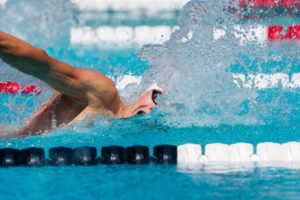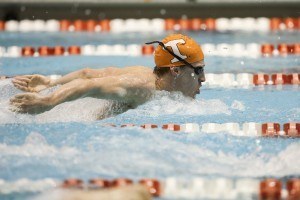We’ll be previewing the top 10 men’s and women’s programs from the 2016 NCAA Championships – stay tuned to our College Swimming Previews channel to catch all 20. Can’t get enough college swimming? Check out the College Preview issue of SwimSwam Magazine for more team previews and power rankings of every major Division I conference.
Key Losses: Sean Lehane (18 NCAA points, 5 NCAA relays), Mauricio Robles (32 NCAA diving points), Gustav Aberg Ljedstrom (3 NCAA relays)
Key Additions: Gleb Ionchev (Israel – sprint free/fly), Braga Verhage (Australia – sprint fly/free), Mark Hinawi (Israel – distance free), Taylor Abbott (TX – distance free), Matthew Garcia (FL – back), Alec Connolly (TN – sprint free), Nathan Murray (NC – back)
2015-2016 Lookback
The exact inverse of SEC rivals Auburn, Tennessee had a somewhat disappointing team finish in the conference rounds only to rocket up the boards at the NCAA Championships.
The Vols were 6th at SECs, essentially the bottom of the conference’s top tier. On the upside, though, senior Mauricio Robles won two of three diving events and fellow senior Sean Lehane rose as high as 4th in a very strong 200 back field.
But the team saved its best stuff for NCAAs, charging to 7th overall – 4th among SEC teams and the program’s highest finish in 15 years. That was keyed by a NCAA diving title from Liam Stone and a runner-up finish from breaststroker Peter John Stevens, plus Lehane managed to remain 4th in the 200 back, besting all three SEC opponents who topped him at conference.
Sprint Free: B-

Kyle Decoursey was a sprint sensation as a freshman. (Photo credit: Tim Binning)
Last year was pretty much the Kyle Decoursey show, with the freshman serving as the lone sprint entrant at NCAAs and the only SEC finalist. Decoursey was a revelation as a rookie, dropping from 20.0 to 19.4 in the 50 free and 44.2 to 43.2 in the 100.
That kind of development is the ray of hope for the Vols in 2017, as already-questionable depth graduated out NCAA relay member Gustav Aberg Ljedstrom. Ryan Coetzee is the other returning scorer, but his 2016 performances (19.8/43.2) leave him much more at the SEC scoring level than NCAA-caliber without a really big year.
The sprint recruiting was solid, especially internationally. Israel’s Gleb Ionchev and Australia’s Braga Verhage both figure to be 19-second guys this year, though that’s dependent on converting long and short course meters times into yards. Domestically, local pickup Alec Connolly has been described as an “insane athlete” by his coach, and since we covered his commitment about a year ago, has already dropped from 46.3 to 45.0 in the 100 free.
Tennessee will have to hope for Decoursey-like rookie years from that trio to hold pace in the sprint relays, which graduated 4 of 8 NCAA legs.
Distance Free: B+
There’s potential for a much, much higher grade here, but it just hasn’t come together in the postseason enough yet to bank on it. Tennessee has one of the most talented distance crews in the nation. Last season, Evan Pinion went 4:14.9 and 14:44 in the 500 and 1650 frees (respectively) at Tennessee’s mid-season invite in November. But a medical issue made him a late NCAA scratch. That’s the second-straight year Pinion has impressed in the regular season but backslid by NCAAs.
In addition, then-sophomore David Heron was 14:55 at midseason but gained 7 seconds at SECs and then 8 more by NCAAs to miss scoring. The Vols have seen some great distance swimmers sidetracked by various medical ailments on both the men’s and women’s sides the past few years, but the year the team gets healthy could be scary for opponents.
And the Vols will load up with even more talent in 2016-2017, with Open Water Junior World champ Taylor Abbott and Israeli national record-holder Marc Hinawi joining the roster.
The downside is that most of these guys are confined more to the mile and open water swimming, with less NCAA 500 free potential. There’s way, way too much talent here to grade any lower than a “B”, but until this crew proves it can score more than a few points at the NCAA level, it can’t quite rise into “A” range.
IM: B

KNOXVILLE,TN – NOVEMBER 22, 2015 – Sam McHugh during the Tennessee Invitational Allan Jones Aquatic Center in Knoxville, TN. Photo By Craig Bisacre/Tennessee Athletics
Sam McHugh looked great last year, earning All-America honors with a 7th-place finish in the 400 IM at NCAAs. McHugh was also an SEC finalist in both IMs, wasn’t far off of scoring at NCAAs in the 200 IM and was a very consistent postseason presence who did his best swimming at the high-pressure NCAA Championships.
But depth is a concern, with the Vols scoring no other IMers at SECs and only entering one other 400 IMer outside of McHugh.
There aren’t any major IM commits on the way in, so it’ll be up to improving veterans to chip in any other SEC points, or Tennessee won’t be able to support McHugh at all at conference. Still, an IM stud like McHugh by himself is worth a pretty solid NCAA points haul.
Fly: C
Tennessee really struggled here last year, with only McHugh scoring at SECs in the 200 (14th in 1:45.0) and Coetzee (15th in 47.3) and Tyler Mills (18th in 47.3) earning points in the 100.
The recruiting class here has a lot more potential, but a ton of it falls on unproven commodities in Ionchev and Verhage. The Australian Verhage has short course meter times that convert to 21.1 in a 50 yard fly and 48.2 in a 100 yard fly, and that bodes well as the meters-to-yards transition should be much smoother from SCM to SCY than from LCM. Ionchev adds another wrinkle – he’s swum a long course 50 fly that converts to 21.7, but it’s hard to tell how much endurance he’ll have for the 100 yard race, especially given how much better his 50 free (22.7 LCM) is than his 100 free (50.6).
Again, NCAA points feel like a longshot – Coetzee is good enough in the sprints to be serviceable on the medley relays (he split 46.0 and 20.9 at NCAAs last year) but this is still a weak event for the team individually, even at the conference level.
Back: C+

Joey Reilman looks to fill in for graduated star Sean Lehane. (Photo credit: Tim Binning)
Losing a stalwart backstroker like Lehane is never easy, but to Tennessee’s credit, they did reload as best they could with the recruiting of Matthew Garcia. The freshman out of Sarasota, Florida comes in with best times of 47.8 and 1:45.1, which should make him an SEC scoring threat early on. And Lehane’s huge improvement curve while in Knoxville (he came out of high school at 49.0 and 1:44.9 and left going 45.7 and 1:38.7) suggests Garcia could explode in much the same way.
In addition, Joey Reilman was pretty good as a freshman (48.5/1:42.7) and might be the best early candidate to step into Lehane’s shoes.
Other rookies Nathan Murray (1:44.1 in the 200) and Verhage (converted to 49ish in the 100) restock what should be a young backstroke group with some upside, though major postseason points may still be a year or two away.
Breast: A+
If the grading has seemed harsh on the Vols until now, it might be because their best event by a longshot is the last on our report card. Tennessee has an extremely good breaststroke group that could very likely challenge Missouri’s for the title of best in the SEC and perhaps best in the country.
Peter John Stevens is a game-changer in the sprints. The owner of the second-fastest 50 breast split in history (22.69 from last year’s NCAA meet), Stevens is also the defending NCAA runner-up in the 100 breast and looks on the cusp of breaking 51 seconds in that race.
He’s less of a threat in the 200, but the Vols are hardly reliant on one breaststroker. Ethan Browne was 4th at SECs in the 200 (1:54.0) and 9th in the 100 (53.2) as a freshman, plus fellow rookie Matthew Dunphy scored in both races, as did junior Ross Dibblin. Any of those guys could be ready to make the jump to NCAA scoring level, which would push the Vols from great to greater in an NCAA landscape where breaststroke talent is fairly spread out nationally.
2016-2017 Outlook
There are no doubt some obstacles to overcome for Tennessee, which graduated more NCAA points and relay legs than any other team in the SEC. But the building blocks are there to reassemble the lineup quickly, especially if the distance corps swims to its potential and if the young sprinters adapt in a hurry.
Liam Stone is back on the diving boards, which mitigates the loss of SEC champ Robles. Replacing the graduated Lehane is tougher, and might turn out to be the key to keeping the relay points flowing for the Vols, who finished inside the top 8 in both medleys at NCAAs a year ago.
Stone and Stevens should score the bulk of the NCAA points. For Tennessee to make a repeat appearance in the top 10, it’ll take a really outstanding year from a lot of depth players and plenty of clutch swimming from the new relay legs.

Peter John Stevens does not have the fastest 50 breast split ever, Chuck Katis does from prelims at 2015 NCAAs at 22.64.
Divers are a huge factor for this UT team. Along with a few elite stars such as Stevens, DeCoursey, Browne, McHugh, and hopefully the distance stars (if they can step up). Relays are getting stronger with Stevens at breast and now-sophomore DeCoursey stepping up. I definitely expect UT to be top 10, but maybe not #7….
The Vols will find the way into the top ten this year. Hopefully Pinion will be healthy. The team is poised to have a great year as long as stay injury free. They can not afford to lose Stone or Stevens. If they do it will be disaster.
pinion healthy lol